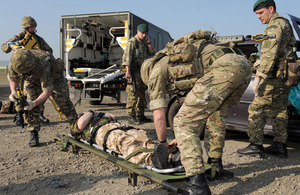Navy medics train for rapid reaction operations
Royal Navy medics have been sharpening their skills in the field in preparation to support 45 Commando Royal Marines lead the UK's response to unexpected global events.

Members of 3 Commando Brigade's Royal Navy medical services as they practise their role two light manoeuvre capability on Exercise Green Serpent [Picture: Petty Officer Airman (Photographer) Sean Clee, Crown Copyright/MOD 2012]
Under Exercise Green Serpent, lessons learnt by Royal Navy clinicians and ground medics while deployed in support of operations in Afghanistan were brought to the Royal Marines Base at Chivenor as they put their mobile medical facility to the test for future operations.
Called the Commando Forward Surgical Group (CFSG), the advanced field hospital treats casualties brought in from medics on the field before sending them to a standard hospital for more extensive treatment.
Royal Navy clinicians deployed at National Health Service (NHS) hospitals around the UK could be called forward at short notice to support the CFSG which boasts an accident and emergency department, a surgical room with two operating tables and an intensive care unit. There is also a laboratory for testing blood and an ability to provide a limited number of transfusions.
Surgeon Captain Steve Bree, the Royal Marines Surgical Team’s Operational Clinical Director and consultant paediatric anaesthetist at Derriford hospital, Plymouth, said:
The idea of having a highly mobile hospital facility is that we can get it put up and taken down within an hour - allowing us to get our surgical teams as close to the fighting troops as possible.
45 Commando will be the lead Commando group for the next 18 months and will be poised to react to operations at very short notice. As one of the support arms, it will be our job to deploy alongside them.
When the troops go out the CFSG provides life and limb saving surgery within two hours from the point of wounding before we then transport them on for further treatment. This facility massively improved the ability to sustain life in Afghanistan and by exercising this as part of Green Serpent we are giving our clinicians the chance to constantly develop it to suit our amphibious operations.
The NHS cites the critical time period for medical help for a wounded patient as the ‘golden hour’ – the first 60 minutes from the moment of injury the most crucial if they are to survive their injuries.
Yet, in Afghanistan, that time period has lessened to the ‘platinum ten minutes’ - usually the time it takes to apply a tourniquet or blood clotting agent in the field to prolong the time a person has to reach a doctor.
From there a patient must see a professional medic within 50 minutes before being moved to the CFSG for life and limb saving surgery. In severe cases patients would be transported directly to a hospital such as Bastion rather than stop off at the CFSG on route.
THE CFSG is an interim field hospital where clinicians will do things like pack a wound to stop it bleeding or stabilise a shattered pelvis before a patient is moved to a hospital such as Bastion or the hospital ship - RFA Argus,” explained Surgeon Commander Andy Brown, Staff Officer 1 Media Operations.
It is quick damage control work aimed to massively improve the chance of that person surviving their injuries in the time it takes to get them to surgery. We have to keep things moving so we take patients in, we use the clinical team here to stabilise their injuries and then we evacuate them out – it is a fast moving process.
Exercise Green Serpent is about the Medical Squadron getting on track and back to our core business which is supporting the Royal Marines in a maritime environment.
From April, 45 Commando will be providing the contingent capability – a key part of UK defence in which forces are versatile and able to respond quickly to any given scenario.
As a supporting arm the Medical Squadron would pull in their clinicians from hospitals across the country and send them into the field alongside 45 Commando.
One clinician on standby is consultant anaesthetist at Queen Alexandra hospital in Portsmouth, Surgeon Commander Barrie Dekker, who deployed on Operation HERRICK 14 last August with 3 Commando Brigade:
Here in the field the hospital is completely different to what we had at Camp Bastion in Afghanistan,” he said.
Camp Bastion has developed into one of the first class trauma centres in the world and as a consultant we have all the equipment we would need there to perform a major resuscitation.
The CFSG is not designed to be that type of permanent static building – in the field we have more limited resources so we do what we can to help that patient survive to reach further treatment.